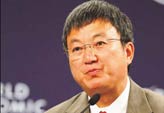Nuclear to remain in energy mix
Updated: 2011-09-23 09:59
By Lan Lan (China Daily)
|
|||||||||
|
A booth of the State Nuclear Power Technology Corp Ltd at the China International Nuclear Power Equipment Exhibition 2011. [Photo/China Daily] |
Carbon capture also key part of plan to cut emissions by 2015
BEIJING - Nuclear power will remain a component of China's energy mix to help the country reduce greenhouse gas emissions, with safety as a precondition, China's top climate change official said on Sept 22.
"Currently and in the future, in a bid to control greenhouse gas emissions, China will rely chiefly on saving energy, enhancing energy efficiency, developing renewable energies and developing nuclear power on the premise of ensuring safety," said Xie Zhenhua, vice-chairman of the National Development and Reform Commission.
Following the huge Japanese earthquake in March, China suspended approval of new nuclear projects and there has been speculation that the country would scale back its nuclear energy program.
As the world's largest coal consumer, China's energy consumption structure cannot be easily changed. So carbon capture utilization and storage (CCUS), a low-carbon technology, can play a critical role in carbon emission reduction, Xie said.
Ministers and industrial leaders gathered in Beijing to attend the five-day Carbon Sequestration Leadership Forum to discuss further collaboration on research, demonstration and deployment of CCUS technology.
Adoption of the technology has been slowed in some countries due to high costs, safety concerns and tight financing conditions. A few projects in developed countries were halted last year.
Both energy demand and carbon dioxide emissions doubled worldwide in the past 40 years and the technology is a necessary part of the low-carbon future, said Richard Jones, deputy executive director of the International Energy Agency.
The technology exists and works, but there are a number of specific challenges including the lack of basic policies in most of the world, high costs and a business model that has yet to take shape, Jones said.
China will continue to increase investment in CCUS research and development through 2015, Minister of Science and Technology Wan Gang told the conference. The country has budgeted more than 400 million yuan ($62.7 million) for CCUS research and projects for 2011. This government spending is expected to generate 2.3 billion yuan in additional investment from business and other sectors.
China also plans to launch a CCUS Industrial Technical Innovation Alliance to promote the technology through the cooperation of companies, the academic world and research institutes, he said.
"Promotion of pioneering projects should be premised on technical and economic feasibility, instead of ... gaining government subsidies," he added.
Coal remains the primary source of energy in China, which gets more than 70 percent of its electricity from the fuel.
China is set to cut carbon dioxide emissions by 17 percent and raise the proportion of non-fossil fuels in primary energy consumption to 11.4 percent over the 2011-2015 period, compared with 8.3 percent now.











